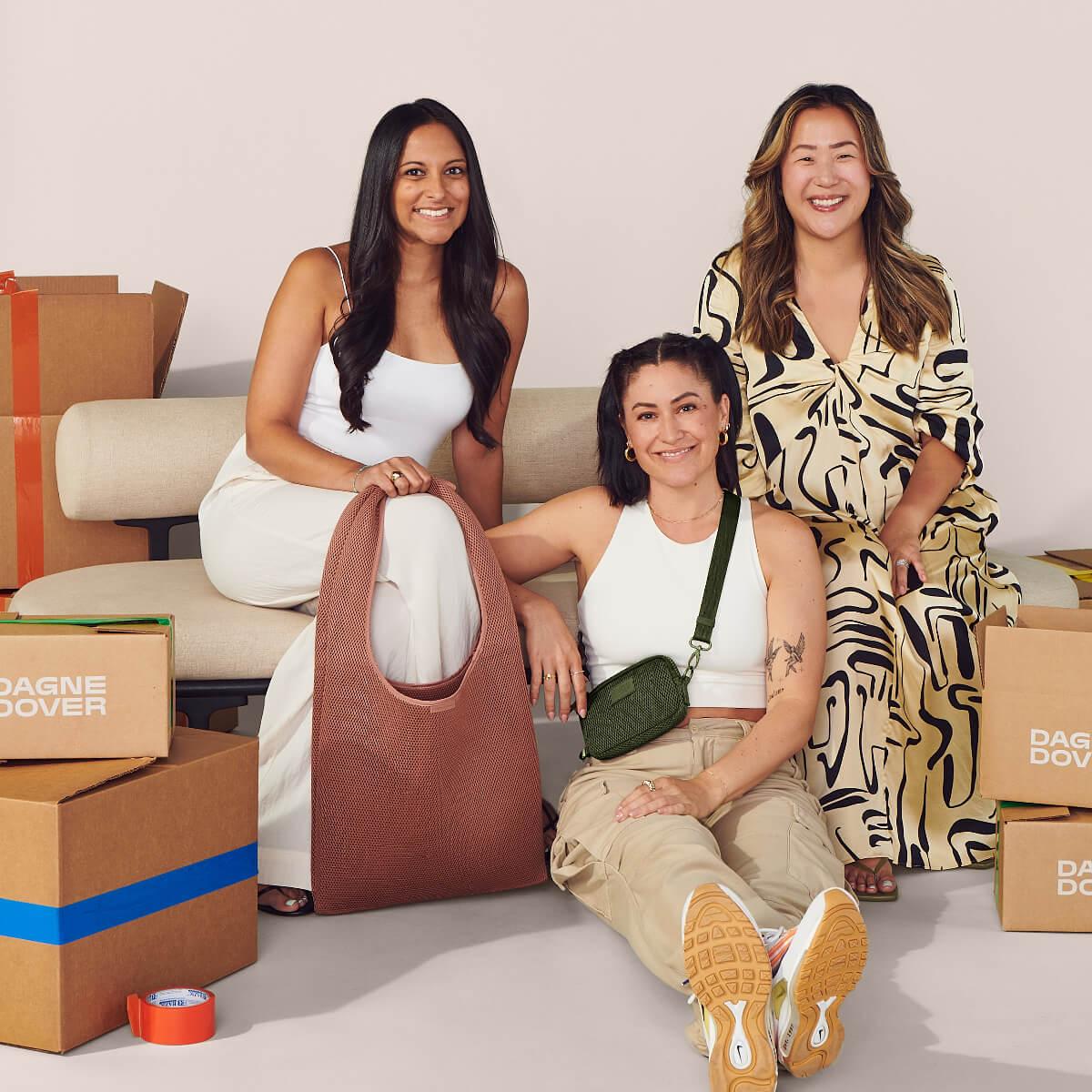There's a good chance you never leave your home without at least one fabric sack to securely carry all of your items, things, and doohickeys. We're all just little packrats constantly on the move, and those who appreciate stylish, sustainable, and ethically-designed bags may know of Dagne Dover: A women-founded company that makes problem-solving travel bags.
Co-founded by CEO Melissa Mash, COO Deepa Gandhi, and CCO Jessy Dover, Dagne Dover's philosophy is that "responsibility isn't a fad," but rather a necessity.

(From left to right): Co-founder and COO Deepa Gandhi, co-founder and CCO, Jessy Dover, and co-founder and CEO Melissa Mash
Dagne Dover is known for offering sleek, stylish neoprene bags. It must be noted the production and discarding of neoprene — a strong synthetic rubber material often used to make wetsuits — is created via an energy-intensive, carbon dioxide-emitting process that withdraws chemicals from petroleum, a non-renewable resource.
But no company offering new products is perfect, and Dagne Dover deserves credit for taking several different steps to prioritize Mother Earth.
The company utilizes its scrap materials, incorporates sustainable materials like REPREVE (made of recycled plastic bottles), and prioritizes AZO testing to ensure no hazardous chemicals or synthetic dyestuffs end up in products.
Plus, Dagne Dover donates its inventory and return surplus to various charities, including the Shelter Partnership of Los Angeles, and its Almost Vintage program encourages buyers and sellers to partake in secondhand shopping (which we love).
In honor of Asian American and Pacific Islander Heritage Month, Green Matters spoke exclusively with Melissa Mash, a proud Korean American, and Deepa Gandhi, a proud Indian American, via email about how their AAPI heritages have impacted Dagne Dover's morals and mission.
This interview has been edited and condensed for length and clarity.
GREEN MATTERS: How did your AAPI heritage impact the birth of Dagne Dover?
MELISSA MASH: While growing up in the American midwest, witnessing my Korean parents constantly evaluate “what is normal here” illuminated to me how relative “norms” are, and therefore, how much they should be questioned. Growing up I didn’t think there was one right way to be or path to follow. I freely pursued my passions and challenged what was possible, not to mention the status quo.
We don’t do anything just because it’s the way “most brands do it.” We question everything to make sure we’re making the best decisions. “Dagne” is a Nordic word for “new day," and this brand is meant to be a new day for changing the standard of what people expect.
DEEPA GANDHI: As a first generation South Asian American, I learned the importance of both hard work through an entrepreneurial lens. This laid a foundation for the work ethic and resilience I brought to co-founding Dagne Dover.
The importance of inclusivity and being curious about other cultures has become pivotal to me. During childhood, I felt that I lived two lives, one at school and one at home. We wanted Dagne Dover to be an inclusive brand, one that a younger version of myself could see herself working at. Our collective experiences make us stronger and more aware and we hope our team and customers feel that.
GM: How does Dagne Dover practice social responsibility?
MM: With every online order, customers can pick one of several organizations that their purchase will help fund. Our community is wide-reaching and can have different priorities and passions. We also have a heroes discount on our site where military, veterans, teachers, and healthcare workers can sign up and get 20 percent off year-round as an acknowledgement of their impact on our communities.
GM: Who are some women and/or AAPI founders who’ve inspired you? How do you hope to inspire others?
MM: Jing Gao from Fly By Jing consistently partners with Asian-American brands and influencers. She keeps the message promoting Asian culture, ingredients, and voices extremely consistent.
With two of us having parents who immigrated to the U.S., capital efficiency and a strong work ethic were ingrained in us from an early age. Dagne Dover’s success is in part due to the tightly controlled business processes and culture we developed from witnessing our immigrant parents think through all the “worst case scenario” pieces in order to protect what they were building.
DG: The most inspirational women or founders are ones honest about their life story, experiences, and successes and challenges. PepsiCo's former chair and CEO Indra Nooyi is a great example of an unbelievably successful South Asian woman who speaks openly about what it takes to have her type of career while balancing being a mom, wife, daughter, and so much more.
GM: What advice would you give to aspiring AAPI entrepreneurs who want to enter the sustainable space?
MM: It’s more expensive and difficult to create products made of recycled materials, and customers may not always appreciate that premium or additional work. But to push our society forward, entrepreneurs today need to focus on smarter, better, and more sustainably-minded solutions in order to compete and invest in brand and product longevity.
“Greenovation” is a series from Green Matters that invites founders of companies that are not only disrupting industries, but also trying to change the planet for the better.

